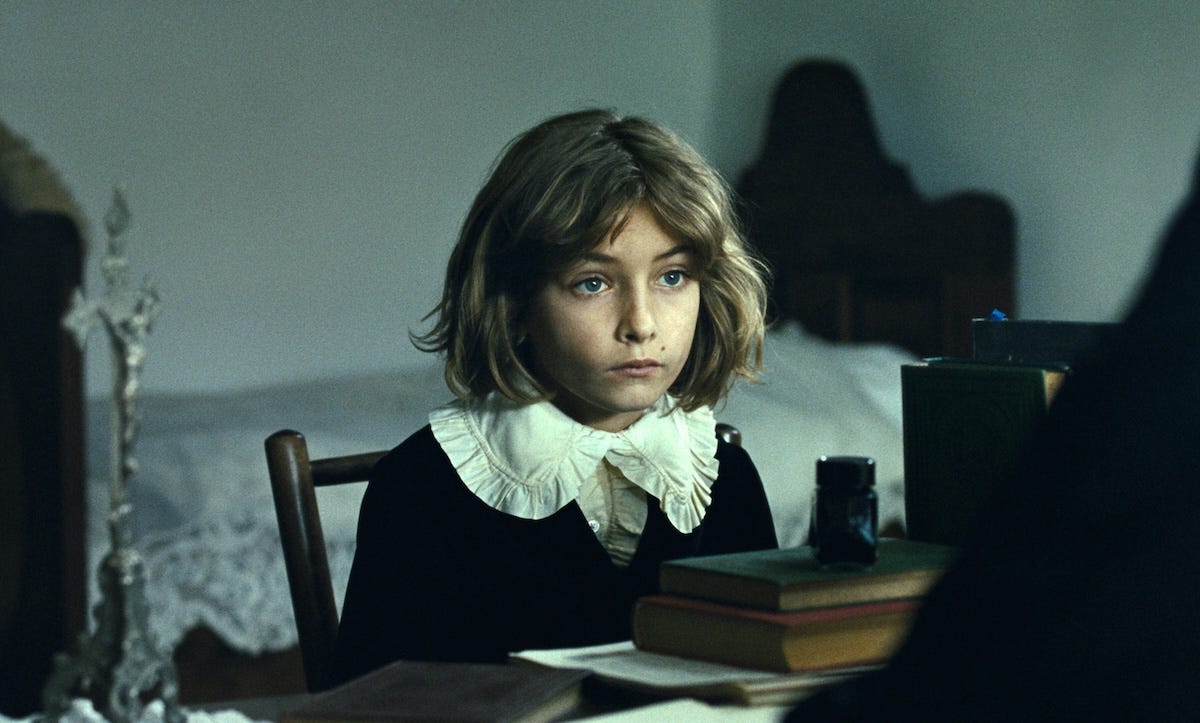Babygirl feels like a mishmash of half-formed ideas—some interesting, some banal—that never quite gel into coherent or compelling drama.
The premise is relatively straightforward. Romy Mathis (Nicole Kidman) is the CEO of a company working the space of AI robotics. Her marriage is not loveless, precisely—she obviously feels affection for her husband, Jacob (Antonio Banderas), and the film opens with the two of them having sex—but it is unfulfilling (after the sex, she has to quietly watch internet pornography to, erm, finish). Enter Samuel (Harris Dickinson), a hot intern whose commanding personality appeals to Romy’s need to feel sexually dominated. Will their affair cost her her career and her family?
It’s not quite a gender-flipped Fatal Attraction because Samuel isn’t dangerous, but that might have been more compelling. As it is, there’s a weird push-pull between acknowledging the absurdity of the situation on both a personal and a professional level and papering over the transparently unethical nature of what’s going on with a lot of modern therapy-speak about “dated idea[s] of sexuality.” (This is an actual line from the film.)
One thing writer-director Halina Reijn keenly portrays here, as she did in 2022’s far superior Bodies Bodies Bodies, is the tension between life as it is actually lived and the weird weaponization of progressive ideals in both the workplace and interpersonal dynamics. Key here is the character of Esme (Sophie Wilde), a junior executive at Romy’s company who is constantly pitching projects to help women move up the ladder—odd, given that Romy herself heads it and a woman also seems to be her number two at the company—and eventually uses soft blackmail against Romy to achieve her ends all while parroting corporate lingo about women’s empowerment.
Indeed, there’s an interesting story somewhere in the tangle of ideas of the soullessness of AI automation and the grasping mediocrity of the contemporary corporate drone crashing together against the repressed sexuality of the modern individual. But Babygirl doesn’t really mine that territory for thematic resonance because it’s too busy assuring us that there’s nothing wrong with Romy and Samuel’s dalliance. At times, the movie feels a bit like a meme you may have seen, the one where a hot guy flirts with a female employee and she responds positively, but when an overweight dork does the same, she calls human resources in a panic.
And that’s because Harris Dickinson is genuinely charming and attractive in that sort of roguish, bad-boy way. Nicole Kidman, of course, is Nicole Kidman. (That neither of them really sounds like a native speaker of American English is fine, since none of the main characters sound like Americans; every dialogue exchange is an amusing tangle of bizarre accents.) The inappropriateness of their relationship is acceptable to us, the viewer, on a certain level despite the difference in power between them because everyone involved is quite hot and everyone more or less seems to be consenting, even if that consent looks weird to people who, say, don’t want to be made to beg like a dog for treats.
Part of the problem with this movie is that almost everyone is, simply, too accepting of everything going on. Only very briefly does it feel like Romy is in danger of losing her company or her family. Her husband is so open-minded his brain is at risk of falling out. Meanwhile, Romy seems adept enough at navigating corporate waters—and Samuel always seems decent enough not to spill the beans—that there’s only a fleeting moment where it appears as though she’s put her professional future at risk. I’ve seen the film described as an erotic thriller, but it’s neither particularly steamy (at least, it wasn’t for me; no judgment if women being treated like dogs floats your boat) and it’s aggressively unthrilling. There’s just no drama here; everyone’s too tolerant of everyone else’s bullshit for there to be any real stakes.
But then, I probably just have dated ideas of sexuality.
Horrifying news out of Los Angeles this week, as fires have swept across the city, torching an enormous numbers of homes, schools, libraries, etc. My thoughts are with my friends and all the hard-working folks in the entertainment industry. Here’s hoping the winds die down and you guys get a chance to recover.
The great Jean Smart suggested that the industry should cut the awards shows and use that money to help rebuild Los Angeles. I understand the impulse—is anyone really going to want to watch a bunch of movie stars celebrating themselves in the midst of all this horror?—but I think this is the wrong tack. Turn the Oscars into the biggest fundraiser the town has ever seen.
Run it like a telethon. Take donations live on the air. Have Bob Iger and David Zaslav and Ted Sarandos show up with giant novelty checks for $20 million each, each dedicated to a different library or school or other destroyed public space. Send your craft services teams to impacted areas right now and film the footage for a clip during the show. Challenge each of the studios to make it a competition to see who can raise the most money. The Oscars audience has dwindled in recent years, but it’s still consistently one of the most-watched non-NFL programs of the year: use that audience to help those who have been hurt by the disaster.
If you can’t wait to donate, you can never go wrong with José Andrés’s World Central Kitchen, which has teams on the ground helping feed first responders. Two additional charities I’ve had folks recommend are Global Empowerment Mission and the California Community Foundation. I’m sure they’ll all make good use of every penny.
Assigned Viewing: The Childhood of a Leader (Criterion Channel)
We’re talking The Brutalist on Across the Movie Aisle this week, so I thought I’d check out director Brady Corbet’s first film, The Childhood of a Leader. Largely set in the immediate aftermath of World War I, as diplomats were hammering out a peace accord everyone but Germany could live with, the film follows a young boy whose troubling behavior sets the stage for his ascension to the head of a fascist European party.
I’m not sure it quite works—I found myself flummoxed mentally calculating the sequence of events that would lead to an American youth becoming a Mussolini-style figure in Europe—but it is nevertheless compelling. That’s partly thanks to the great cast: Child actors can be hit-and-miss, but Tom Sweet is chilling as the budding sociopath, and it’s always nice to see Corbet regular Stacy Martin. Vox Lux remains Corbet’s masterpiece, but everything he’s made so far has been well worth watching.





"Her husband is so open-minded his brain is at risk of falling out." Best line written, EVER!!!
I also love your idea for the Oscars, I really think it would bring in a lot of donations, and maybe the zillionares will try to outdo each other in such a public setting!
I think the charity awards is a great idea--whenever there is some sort of tragic event in a small town/rural area, the media always does these feel good stories about the community coming together to rebuild; I think it would go a long way in showing that some rich people are very invested in their actual communities/the public spaces of their communities.